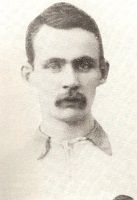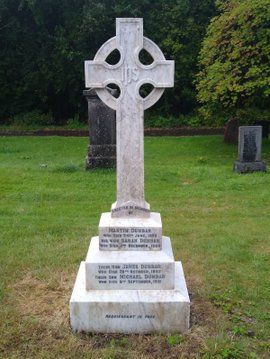Michael "Mick" (and Thomas "Tom") Dunbar

Michael "Mick" Dunbar was one half with Bobby Calderwood of a Scots- international wing-pairing, although never together, that would emerge in the 1880s from the remarkable, Busby village team Cartvale. It would also at the same time be the club of centre-forward and Brazilian footballing pioneer, Tommy Donohoe.
Both too would go on to play for Cowlairs but with that Dunbar and Calderwood's careers would diverge. Whilst the three-cap latter twice went south, single-cap-in-1886 Dunbar never did but remains the one with the greater legacy, mainly because his subsequent time with Celtic. He was in its first ever team to play and beat Rangers. And in 1897 he went on, after retirement through injury, to become a director of the Parkhead club, remaining so for more than two decades until his death in 1921.
Like Donohoe Dunbar had been born in 1863. Indeed, whilst his father was by birth a Scot, again like Donohoe his mother was Irish. Moreover she was a Donoghue, a Dunahue or Donohoe, depending on the source, and, like Tommy Donohoe's father, from Co. Wicklow. There is thus every possibility that Dunbar and Donohoe were related, distant cousins. His birth was at Sheddens by Busby and it was in the latter he grew up and remained, whilst with the village club, Scotland representation and working in the local printfield with Calderwood and Donohoe, then seasons each at Cowlairs and Hibernian. Only once he was recruited by Celtic in 1888, where he was also joined by younger brother, Tom, did he move to Glasgow, where he would spend the rest of his life. But he moved officially still not as a footballer. In 1891 in Busby still he was Spirits Merchant, a publican, in 1901 in Glasgow he was the same and on his death "Wine" had simply been added to the descriptor.

Mick Dunbar's death was at the early age of just fifty-seven. Even then he had been ailing for a year. Tom would die even younger, in 1908 at not quite forty. And it seems that Michael Dunbar never married. Until his mother's death in 1909 he shared an East Glasgow house with her, and whilst he was to pass away in a nursing home it was that same house in Dennistoun that would be given as his official address.
And his funeral was widely noted, his requiem mass attended by representatives of many of the most notable clubs of the era. Willie and Alex Maley were there, as was Celtic's first captain, James Kelly, with whom he had shared a Scotland debut (perhaps ironically against Ireland), plus Bill Struth from Rangers. It was all a mark of the esteem, in which Dunbar was held not just at Celtic but in the wider Scottish game. In fact it would not be an exaggeration to say that Mick Dunbar was and remains crucial to the early days of the club both on but particularly off the field.
Birth Locator:
1863 - Sheddens by Busby, Renfrewshire (Mick)
1868 - Busby, Renfrewshire (Tom)
Residence Locator(s):
1871-1881 - Durham Terrace, Busby, Renfrewshire (Mick and Tom)
1891 - Durham Terrace, Busby, Renfrewshire (Mick)
1891 - 71, Abercromby Terr., Calton, Glasgow (Tom)
1901 - 137, Whitehill St., Dennistoun, Glasgow (Tom)
1910-1921 - 89, Armadale St., Dennistoun, Glasgow (Mick)
Death Locator:
1908 - Hillhead, Glasgow (Tom)
1921 - 89, Armadale St., Dennistoun, Glasgow (Mick)
Grave Locator:
St. Peters Cemetery, Dalbeth, Glasgow
Back to the Upper White Cart Trail
or the SFHG Home page